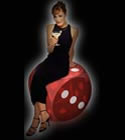Getting Quartered
Even though you won’t have many opportunities Omaha eight-or-better to make great plays, when you have the chance to knock out someone who is drawing to the same hand that you are, you generally should try to do so.
It is of utmost importance either to knock out an opponent who has the same hand that you have or to discard your hand when you are likely to be in this situation.
Since you are splitting a lot of pots, you want to play in such a way that you avoid getting quartered.
It is easiest to gauge when someone has the same low hand that you have, such as an ace-deuce or an ace-trey.
It is slightly harder to ascertain if you and an opponent both have the same high hand.
But you often can get an ideas, and if you suspect that both you and someone else are going in the same direction and trying to make the same hand, then you should either make a play designed to eliminate your opponents or fold if you don’t think you can get him out of the pot.
To continue on but not eliminate this person is one of the worst disasters in this game.
Always keep in mind that trying to win only one-quarter of the pot is not a winning strategy.
For example, if you hold just an ace-deuce and there is a lot of multiway action early, someone else also has an ace-deuce.
Consequently, you probably should fold your hand, expect when you have other winning draws working.
These additional cards may include a suited ace, another low card, or a high pair.
Notice that I am now describing a hand where the cards are working together in more than one way, which could make it a premium hand.
It is difficult to knock out someone who has an ace-deuce draw by raising into him.
However, if someone raises into you, you probably should get out, as you are now trying to win only one-quarter the pot if you make the low reading hands.
Typical players will call the raise cold and then often find themselves quartered when the hand is over.
In other words, they generally are committed to the pot.
However, some of the good players know to fold, especially if the pot is raised and reraised.
Introduction / Automatic Play / High Versus Low in Three-Handed Pots / Loose Games / Multiway pot Versus Short-Handed Play / Scare Cards / Getting Counterfeited / Getting Quartered / Playing Against Steamers / Playing Against Tight Solid Players / Your Playing Style / Fluctuations / Pot-Limit Omaha Eight-or-Better / Afterthought


